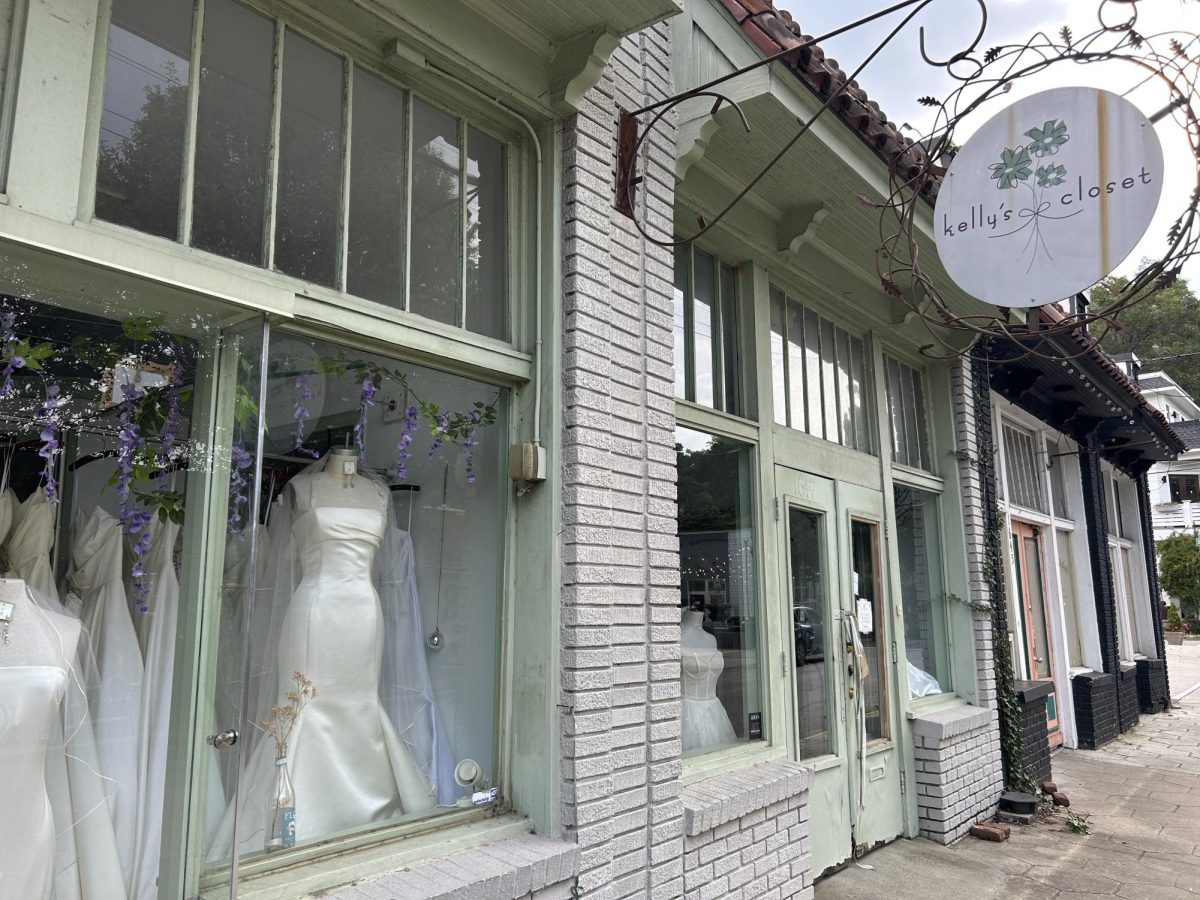
Photo taken by J.D. Capelouto
Paideia is a school for hippies. All the students and teachers are extremely laid back, and recline on couches during classes. They walk around barefoot and leave their stuff everywhere. They even call their teachers by their first names.
Not all the stereotypes about Paideia are right, but they’re 50 percent true. They did seem extremely laid back, they did leave their stuff everywhere, and they do call their teachers by their first names. None of the students I saw, however, fit the stereotype of a “hippie,” and none of the classes even had a sofa in sight. Also, all the students were wearing shoes. Then again, it was the middle of winter.
Paideia offers education for students from three years old, all the way through graduation. The Paideia School website explains that the school strives to create an informal environment in which students still get a good education. Basically, they try to be laid back. The school is made up of 14 different buildings stretching down Ponce de Leon with two libraries, two gyms, a theater, and black box theater, and classrooms for all ages. And even though tuition seems high, Paideia is granting $2.1 million in financial aid to 141 students this school year, so that students can experience Paideia’s unique educational opportunity.
After navigating my way through The Paideia School’s carpool, I turned into a parking lot at the end of the block. Coincidentally, Jennifer Hill pulled up next to me, so I didn’t have to go looking for her. She had set everything up and would introduce me to my guide. We walked across a yard of woodchips in the drizzle and into another building a little ways down the road.
We met senior, Malea Berry just as she was walking out of the library, and she was very enthusiastic about showing me around for the day. She led me out of one building and into one next door. We headed down a narrow flight of stairs, passing lockers shoved onto each landing. The stairwell ended in a simple door which Malea pushed through into a brightly lit, windowless classroom.
“Hi Jack,” Malea said as we walked in the door.
She was talking to the teacher Jack Bross, addressing him by his first name. I introduced myself then followed Malea to the other side of the classroom and took a front row seat. The class was called Music of Faith, a short-term class that was part of a special schedule Paideia students enjoy at the beginning and end of the second semester. Short term seemed like a way to get back into the routine of school, without actually buckling down on hard, long-term classes. Because of it, my entire day was informative, but very relaxed.
Jack began his lecture by talking about composers of the past and using music from his iPod to supplement his lecture. It went on until, all of a sudden, I heard the rustling of papers that, at Grady, accompanies the ringing of the bell. Jack wrapped up the lecture and by the time I stood and turned to see the classroom behind me, most were headed toward the door. I couldn’t place what was so weird about this until I realized: no bells. Students just knew when class ended. The class was an hour long and seemed to end pretty quickly compared to my usual hour and a half classes. We followed others up some stairs at the back of the classroom and out into the rain again.
We went into the building next door, and I followed Malea up the stairs. Students’ belongings were scattered under and around the staircase. I looked down from the landing at the sea of trusting students’ bags, thinking, “This would never happen at Grady.”
When I walked through the door at the top of the steps, I saw another demonstration of the faith and trust people at Paideia have for one another: no locks on lockers.
Sharon Radford taught the next class: Biology Ethics. Sharon passed out an article along with questions about the debate over genetically modified crops. While Malea focused part of her attention on the worksheet, she explained how short term works.
Students received a sheet on which to choose their preferred short term classes. Most AP classes (though not Malea’s AP Statistics class) carry into short term and are mandatory for those in the class. Biology Ethics is a class for those who don’t have a required class second period, and it also supplies academic credit (unlike, I assume, bowling class, bridge class, or understanding dogs class).
Malea’s freshman friend sitting next to her introduced herself as Nahlah Abdur-Rahman and leaned in to join the conversation. AP classes were not the only required classes. As a freshman, Nahlah was required to fit Algebra 2, U.S. politics, and making healthy life decisions into her short-term schedule. As she listed her required classes, Malea commented that she definitely had fewer as a freshman.
This class seemed to pass just as quickly as the last, and once again, I was caught off guard by the students packing up and leaving without a bell. The schedule includes a break after second period, so that there was a break between every two classes: first, second, break, third fourth, lunch, fifth, sixth, home.
During break, people hung out in the library and on the couches in the lobby area. As we walked down a side hall, we stopped by an alcove with four vending machines. Students milled about in the alcove as others slipped in to buy something and take it elsewhere. Before we went to the next class, Malea grabbed something from one of the snack vending machines to eat in the next class.
We headed back outside where the rain had not stopped. Many people walking down the walkway had umbrellas but I hadn’t thought to bring one since at Grady I can get to and from all my classes inside, or at least under cover. We slipped into another building that looked a lot like a house.
The door to the next classroom was glass-paneled, more like a house door than a school, and the fan I saw in the room after we pushed the door open reinforced the image.
The relationship to a house ended there, unless it was a teenager’s bedroom … a teenager who loved history and literature. Posters plastered the walls and projects covered most of the surrounding flat surfaces. The only uncovered spaces were three of the four tables that were arranged in a rectangles in the small area. The fourth one seemed to be utilized as the teacher’s desk. It was also cluttered.
This poetry class was with Clark Cloyd. Clark had an animated style of teaching, with elaborate hand gestures and frank jokes, that captured my interest, so by the end of the first period I was involved in the class discussion about 18th century sonnets. This was one of the short-term classes that lasted two hours long.
During a short break I was left in the classroom with Clark and a couple of his students. He prompted them to talk about how easy short term was, but they were unwilling to admit it. Tests? Quizzes? Homework? He asked about each one trying to make the point that short term was more relaxed. Eventually, one student consented that there weren’t as many tests and quizzes and the homework load was lighter. Despite most of their denials, they all groaned when Clark reminded them that short term ended the next week.
We returned to read and analyze some Shakespeare sonnets. Did you know Shakespeare spelled his name three different ways because language was never set until around the time of the printing press?
Lunch finally arrive when poetry class ended. The literary magazine held a pizza sale that day, and luckily one of the stations was in the theater right across from the building in which Clark’s class was. We were able to slip in just before a long line formed behind us. On the other days of the week, local restaurants bring pre-ordered meals for students or students just bring their own lunch. I finished my two slices with time left during lunch. Many people were crammed inside, sitting on the couches in the high school common area (since they don’t have anything closer to a cafeteria) but everyone I talked to said had it not been raining outside, everyone would be eating in the park across the street.
After an hour of lunch, all that remained for Malea was orchestra. They were working on learning the score for the upcoming school musical, The Secret Garden. Instead of staying in the small windowless room in the basement of the junior high school building, I wandered out into the building next door which I found housed the black box theater and one of two gyms. The people in the black box were working on a play, so I didn’t disturb them. Instead, I helped myself to the hot chocolate and Biscoff cookies laid out on a table.
The next building over was the theatre, and the other gym. There was an elementary group in the gym, so I slipped into the theater where rehearsal for the high school musical, The Secret Garden, was already under way. I sat in a back corner, and talked with some of the students who weren’t working on stage. Feeling guilty about taking the hot chocolate when everyone else seemed to be ignoring it, I asked one of the students if I had broken any rules. We determined I hadn’t because the hot chocolate was for guests, and technically I was a guest.
I watched the cast rehearse for the rest of the school day. When the teacher dismissed everyone I headed out and back down the street to the other side of campus. All in all, my day of short term classes was quite relaxing and fun. It seemed like a good way to get back into the work of school without loading all the hard classes on from the beginning.






